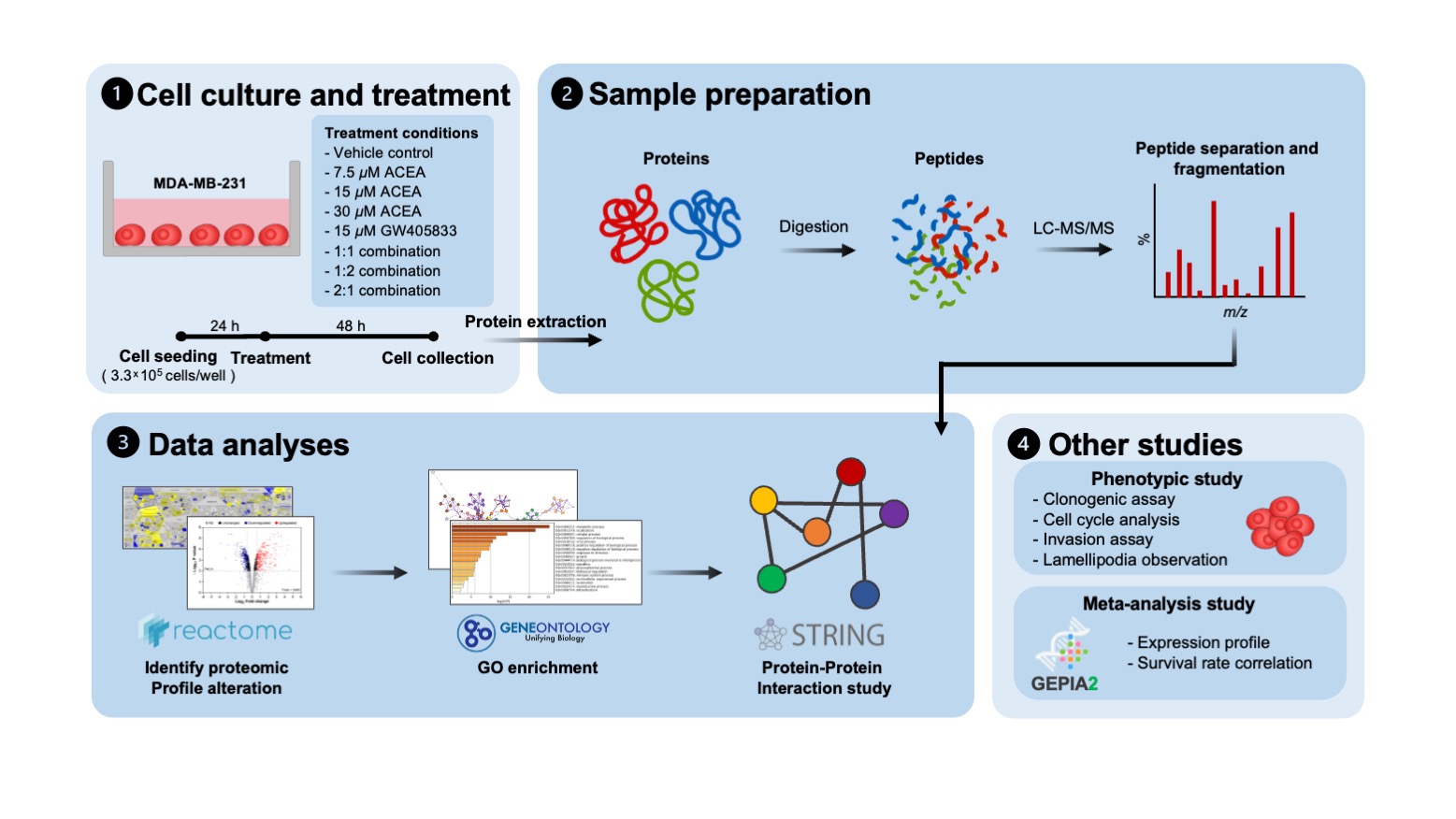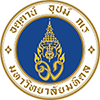
The activation of cannabinoid receptor (CB) has been shown to negatively affect breast cancer cell survival. Our previous study also reported that breast cancer cells responded to various combinations of CB1 and CB2 agonists differently. Nonetheless, the mechanism underlying this effect and whether this phenomenon can be seen in other cancer characteristics remain unknown. Therefore, effects of highly selective CB agonists and their combination on triple-negative breast cancer proliferation, cell cycle progression, invasion, lamellipodia formation as well as proteomic profile of MDA-MB-231 breast cancer cells in this study. We found that specific combination of CB1:CB2 agonists had the strongest anti-cancer effects, which could inhibited colony formation, cell invasion, lamellipodia formation and induced the S-phase cell cycle arrest in MDAMB-231 cells. Our proteomic analysis revealed proteomic profile alteration in MDA-MB-231 upon CB exposure that potentially led to breast cancer suppression, such as ZPR1/SHC1/MAPK-mediated cell proliferation and AXL/VAV2/RAC1-mediated cell motility pathways. Our findings showed that selective CB agonists and their combination suppressed breast cancer characteristics in MDA-MB-231 cells. The exposure of CB agonists also altered the proteomic profile of MDA-MB-231, which could lead to cell proliferation and motility suppression. (Adapted from Chutoe, et al., 2024)
การศึกษาที่ผ่านมาพบว่า การกระตุ้นตัวรับแคนนาบินอยบนเซลล์มะเร็งเต้านม จะสามารถยับยั้งการมีชีวิตของเซลล์ดังกล่าวได้ การศึกษาจากกลุ่มวิจัยของเรายังพบว่า เซลล์มะเร็งเต้านมมีการตอบสนองต่อการได้รับสารกระตุ้นตัวรับแคนนาบินอยชนิดที่ 1 และ 2 ในอัตราส่วนต่างๆ แตกต่างกัน อย่างไรก็ตามกลไกที่ควบคุมการตอบสนองยังกล่าว ยังไม่เป็นที่ทราบ ในการศึกษาครั้งนี้พบว่าสารกระตุ้นตัวรับแคนนาบินอยชนิดที่ 1 และ 2 ในอัตราส่วนจำเพาะ สามารถยับยั้งการเจริญเติบโต และการเคลื่อนที่ของเซลล์มะเร็งเต้านมได้มากกว่าอัตราส่วนอื่นๆ เมื่อทำการศึกษาการเปลี่ยนแปลงในระดับโปรตีโอมิกส์ พบว่าอัตราส่วนดังกล่าวทำให้เกิดการเปลี่ยนแปลงของโปรตีนที่เกี่ยวข้องกับการตายของเซลล์ และการยับยั้งการเคลื่อนที่ของเซลล์อย่างมีนัยสำคัญ เช่น ZPR1/SHC1/MAPK และ AXL/VAV2/RAC1 ซึ่งการศึกษานี้จะเป็นข้อมูลพื้นฐานที่ช่วยในการพัฒนาการใช้สารกลุ่มสารกระตุ้นตัวรับแคนนาบินอยชนิดที่ 1 และ 2 ในการยับยั้งมะเร็งเต้านมต่อไปในอนาคต (ดัดแปลงจาก Chutoe, et al., 2024)
Reference
Chutoe C, Inson I, Krobthong S, Phueakphud N, Khunluck T, Wongtrakoongate P, Charoenphandhu N, Lertsuwan K. Combinatorial effects of cannabinoid receptor 1 and 2 agonists on characteristics and proteomic alteration in MDA-MB-231 breast cancer cells. PLOS ONE 2024;19(11):e0312851.
Relevant SDGs

BC investigator

